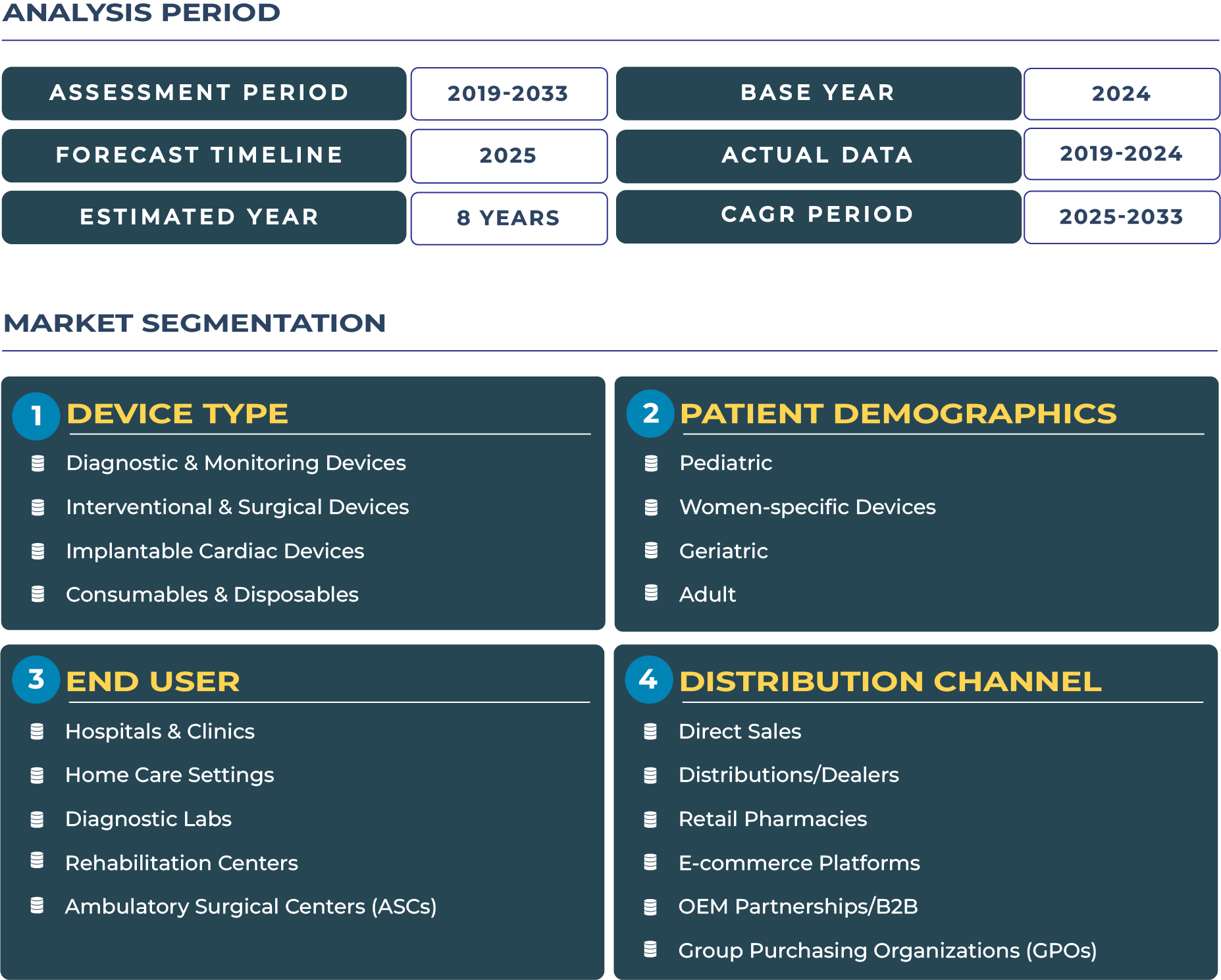UAE Cardiovascular Devices Market Outlook: Medical Tourism and Private Sector Innovation Driving Growth
The UAE cardiovascular devices market is projected to grow from USD 507.5 million in 2025 to USD 670.6 million by 2033, at a CAGR of 3.5% over the forecast period (2025–2033). The steady performance is supported by the country’s role as a medical tourism hub, its expanding private hospital infrastructure, and growing investments in advanced interventional and monitoring technologies. Rising prevalence of cardiovascular diseases among both nationals and expatriates further fuels demand for implantable and minimally invasive devices. While competitive procurement and high operational costs remain challenges, the UAE’s strong healthcare positioning and focus on innovation continue to provide a favorable environment for growth.
UAE’s Cardiac Innovation Anchored in Medical Tourism and Private Hospital Leadership
The UAE has rapidly emerged as a cardiovascular innovation hub where medical tourism and private sector investments fuel significant growth. The nation’s healthcare system, known for advanced private hospitals and premium patient care, attracts patients from across the Middle East, South Asia, and Africa. This inflow of medical travelers, coupled with strong domestic demand for cardiovascular treatment, has transformed the UAE into a key player in the regional cardiovascular devices market. The focus on advanced procedures, including minimally invasive interventional cardiology and the growing use of implantable cardiac devices, reflects the market’s orientation toward high-value technologies.
Dubai and Abu Dhabi, as leading healthcare cities, are strengthening their position as regional cardiac care destinations. Hospitals in these cities are investing heavily in advanced interventional and diagnostic equipment to attract international patients and meet rising local demand. The UAE Ministry of Health and Prevention plays a central role in regulating device quality and safety, while private hospital groups drive innovation through procurement of cutting-edge technologies. The cardiovascular devices industry in the UAE also benefits from favorable economic policies, stable investment environments, and increasing integration of digital solutions such as telecardiology, especially for the large expatriate population.
The outlook for the UAE cardiovascular devices sector highlights steady expansion, driven by modernization, rising chronic disease burden, and strategic positioning as a regional hub for advanced healthcare. Despite competition and operational costs, the ecosystem is set to grow in prominence, reflecting the UAE’s long-term healthcare ambitions under its national development agenda.
Drivers & Restraints: The Dual Nature of Growth in the UAE Cardiovascular Devices Industry
Advanced Private Hospital Sector and Medical Tourism Propel Expansion
The UAE cardiovascular devices ecosystem is heavily supported by a thriving private hospital sector. Groups in Dubai and Abu Dhabi continuously procure advanced interventional systems and implantable cardiac technologies to serve both local patients and medical travelers. The nation’s strategic position as a healthcare hub for the Middle East, Africa, and South Asia strengthens its appeal, as international patients seek premium cardiovascular treatment at competitive costs. Additionally, abundant capital availability enables consistent investment in premium technologies, ensuring rapid adoption of cutting-edge devices across facilities. These dynamics create a unique advantage for the UAE in shaping the regional cardiovascular devices landscape.
Competitive Market and Operational Costs Limit Margins
Despite robust demand, the UAE cardiovascular devices sector faces constraints that moderate growth. The competitive nature of private hospital procurement results in pricing pressures and heightened scrutiny over long-term service commitments. Operational costs, including staffing, logistics, and device maintenance, remain higher than regional peers, creating margin challenges for suppliers. Furthermore, tender evaluations prioritize not only device quality but also post-sale service excellence and clinician training, requiring manufacturers to build strong in-country support frameworks. While these factors ensure quality, they simultaneously create barriers for smaller players entering the cardiovascular devices market.
Trends & Opportunities: Transformational Shifts Creating Market Openings
Rapid Device Adoption and Telecardiology for Expat Populations
One of the defining trends in the UAE cardiovascular devices industry is the rapid adoption of high-value devices, particularly for interventional and minimally invasive cardiac procedures. Hospitals are investing in hybrid operating rooms and advanced monitoring systems, positioning themselves as regional leaders in clinical outcomes. Additionally, the growth of telecardiology is reshaping patient management, especially for expatriates who seek continuous monitoring even when traveling between the UAE and their home countries. This integration of digital health with cardiovascular care strengthens the UAE’s positioning as a forward-looking medical innovation hub.
Opportunities in Private Hospitals and Regional Trial Leadership
Significant opportunities lie in aligning with private hospital procurement strategies, where long-term service agreements and training partnerships are increasingly valued. Companies that engage in clinical trial collaborations can leverage the UAE’s role as a regional pilot hub for advanced medical technologies. Moreover, the UAE’s geographic position and logistics infrastructure make it an ideal distribution base for cardiovascular devices across the GCC and wider MENA region. By positioning themselves strategically within the private healthcare ecosystem, manufacturers can capture long-term value beyond the UAE’s domestic market size.
Competitive Landscape: Strategic Partnerships and Regional Positioning Define Success
The UAE cardiovascular devices market is dominated by international players such as Boston Scientific, Medtronic, and Abbott, alongside regional distributors who facilitate procurement processes and after-sales support. Recent private hospital procurements in Dubai and Abu Dhabi (2024) highlight the premium placed on interventional systems and implantable cardiac devices. Competitive strategies increasingly involve establishing regional headquarters in the UAE, ensuring rapid responsiveness to tenders, and embedding clinician training programs within private hospital partnerships. The nation’s ambitions to serve as a regional clinical trial hub further incentivize companies to localize operations. These strategies reinforce the UAE’s growing role as a central player in the global cardiovascular devices ecosystem.







